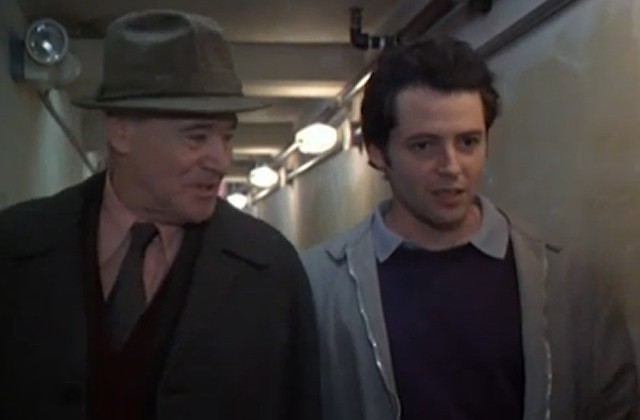Throwback Thursday: A Life in the Theatre offers a unique perspective about aging & acting

Have you ever wondered what life must be like for full-time stage actors? ‘A Life in the Theatre’ provides such insightful glimpses with spirited acting from Jack Lemmon and Matthew Broderick in a TNT original movie that aired in 1993 but is now available on DVD thanks to the Warner Archive Collection.
“All the world’s a stage,
And all the men and women merely players;
They have their exits and their entrances,
And one man in his time plays many parts,
His acts being seven ages.”
I’ve always found that quote from William Shakespeare to be very profound, but it took a movie such as A Life in the Theatre for me to fully wrap my brain around those infamous words. A TNT original movie aired in 1993, A Life in the Theatre stars Jack Lemmon as an aging stage actor named Robert and Matthew Broderick as John, a younger actor who is taken under his wing. I’ve always held both men’s volumes of acting work in greet esteem. I had never heard of this movie, so I decided to give it a look when it was graciously provided by the Warner Archive Collection. I wasn’t disappointed.
Jack Lemmon plays a richly complex character in A Life in the Theatre. Robert is eager to impart his knowledge of the craft he has spent many decades perfecting, but at the same time, I think he also fears his own obsoletion. He knows he is aging and is maybe not quite as capable of delivering performances as well as he used to. He starts to flub his lines more and more, perhaps due to a faulting memory. Other mishaps happen involving faulty props, missed cues and hilarious antics probably only a true theatre buff could spot and enjoy.
At one point, Robert asks John to give a scene “a little less.” It’s almost as if he is afraid that one day Broderick’s star will outshine his own and he will no longer be the leading man on the stage. When he gives him advice, does he truly want him to succeed? Or is he interested in sabotaging his career before it really gets going out of his jealousy for his youth? At times, it’s hard to say with any real certainty.
The dynamics between the two actors are constantly evolving throughout the movie. In one scene, the two seem to be the best of friends with Lemmon giving Broderick much praise about his acting talents and helpful tips for improvement. In another, the two are bickering at each other like an old married couple. Perhaps it’s the cramped quarters of their dressing room. Perhaps it’s the egos of both men involved. After all, aren’t actors traditionally some of the vainest people to ever walk the earth?
Jack Lemmon reminded me a lot of Jon Lovitz’ “The Master Thespian” from Saturday Night Live. Robert knows and has seen it all. He is often seen launching tirades about critics, tirades about the theatre and really tirades about life in general. Matthew Broderick holds his own beautifully; I must give credit where credit is due. He’s more brilliant with his acting chops than he is often given credit for by the critics. I respected his character because anyone who can spend that much time with Lemmon without being overly argumentative deserves a medal. You can tell his patience is tested often, but he rarely allows it to show.
One of the funniest scenes is one in which a flustered Broderick has forgotten his lines and he backs off the stage saying, “he thinks he hears his horse calling.” There is another scene in which Lemmon makes Broderick so crazy that he actually walks off the stage mid-performance, leaving Lemmon to face the audience alone.
I must say it was interesting to see all the behind-the-scenes work that goes into theatre productions – all the blocking, the rehearsals, applications of stage makeup and the banter that occurs between actors attempting to help each other through read-throughs of the dialogue. All stuff I usually take for granted being a non-theatre type. I also enjoyed the fact that we see several productions and not just one. It gives the viewer more a sense of the passing of time, as well as a truer sense of what a life in the theatre necessitates and a broader picture of the two men’s acting talents and range.
However, the best scene takes place at the end. Lemmon delivers several soliloquies to an imaginary audience throughout the movie. What must it be like to have such a presence that you demand an audience everywhere you go even if there is none? Anyway, he is with Broderick on the empty stage reflecting upon how fast a life in the theatre passes you by and then he blows out a match. It’s as if the match symbolizes the fact that Lemmon knows he is fading away out of the limelight and perhaps will face his final curtain call sooner than he’d care to. It’s a really poignant performance; I like that the movie ends rather open-ended for you to interpret what happens to the two actors next.
While there are no bonus features or added frills to this DVD that is rather short at just 78 minutes, A Life in the Theatre is a stripped down story that I liked more than I thought I would. If you’ve ever been involved in or a fan of community or stage theatre productions, I think you might enjoy it too. It’s worth a look.
 CliqueClack
CliqueClack
